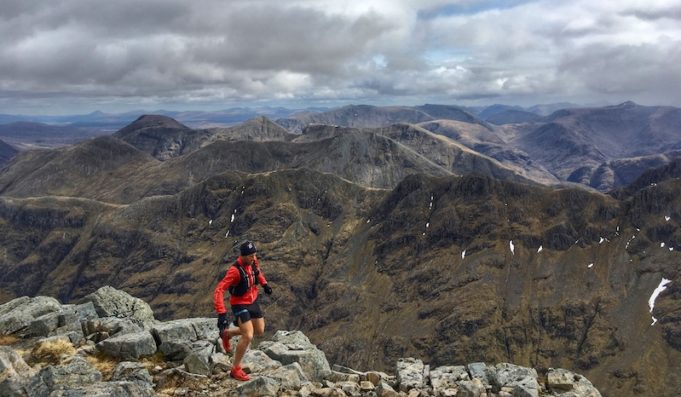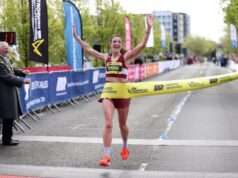Endurance running coach Donnie Campbell, has spent most of the last 10 years taking on some of world’s toughest ultra-running challenges, learning to push himself to the limits in order to be the best he can be. In his story, ‘Reaching my Peak‘, he recounts his record breaking run in the Ramsay Round, which saw him run up 24 Munros in less than 24 hours, pushing himself through sickness and injury to finish the race. We spoke to Donnie to hear more about his motivations for racing in these punishing, all-or-nothing competitions.
How and when did you first get into running? At what point did you decide to take your running to the ‘next level’?
I properly got into running in 2008/2009. Growing up, my main sport was Shinty – I represented Scotland at U18 level before joining the Royal Marines. After University, I started running more to lose some weight and get fit to play Shinty to a high standard again. It was when I was getting fit that a friend suggested a 150-mile race over 5 days on the Isle of Islay and Jura in 2009. I agreed to it and ended up loving the race and the training for it. I finished 4th and that was my first step into ultra-running. I never got back to playing Shinty as ultra-running became my passion. I realised I had the potential to improve and get more competitive, but I had so much to learn. It was not really until 2012 that I started preforming consistently and winning competitive races.
What is it about running that you really enjoy? People often say that running “clears your head” – is that something you’ve found over the years? Or does your level of running require a different headspace altogether?
Ah, that’s a hard question! There is so much I like about trail/mountain running, it is a great way of exploring the hills and taking in amazing scenery. I like how it gives you the opportunity to explore yourself and your limits and it also keeps you honest and humble – if you don’t respect the mountains that you are running in, you can soon get into trouble. Trail/mountain running for me is also a way of de-stressing, clearing my head and connecting with nature.
Most of the runs you do are properly managed races rather than being endurance challenges you run on your own. What is it you like about the racing element of races? Does it allow you to push yourself further?
For me, racing is what gives my training focus, motivation and an excuse to travel. Racing is also an easier way of exploring your limits, as planning an expedition/adventure or challenge takes a lot more planning and logistics, whereas with races you just need to turn up and run as fast as you can! I have always been curious about how far I can push myself and these races is good way to test it.
One endurance challenge you have attempted is the Ramsay Round, a challenge which sees runners attempt to run up 24 Munros (mountains) in under 24 hours. Why did you decide to attempt the Ramsay Round?
I have had my eye on the Ramsay Round since I first heard Charlie Ramsay, the man who created the round, talk about it at a presentation in Edinburgh, many years ago. Unfortunately, my summers are always packed with races so I could not fit the Ramsay Round in. So, if I wanted to do it, I had to do it in the winter!
Running up 24 mountains in under 24 hours sounds like an incredibly difficult challenge to take on – especially in winter. What effect did that have on you physically? Was there any point in which you felt like giving up?
Physically, it was very tough. By the time I had completed 18 of the 24 mountains, the nausea had set in and completely put me off eating. My legs felt heavy due to the snowy conditions underfoot and I was in agony from the Morton’s Neuroma – an inflammation of the nerves which made every step feel like someone was stabbing the ball of my foot. I didn’t feel like giving up though. For whatever reason, I have always been able to push myself close to my limits and the Ramsay Round was no different. When I finally finished, I had nothing left and was unable to respond to those wishing me congratulations – but I’d done it.
Even when you are under intense physical stress, you are able to finish the race. How can you cope and carry on running when you’re in such physical pain?
Mental strength, toughness and experience. If you have a high level of motivation to succeed you will normally find a way to keep moving. Sometimes it involves a real battle with your mind, but if you know how to control your mind then you can normally make the right decision and keep going. A book I find really helpful in winning that battle is “The Chimp Paradox” by Dr Steve Peters who has worked with Chris Hoy and Victoria Pendleton.
Your mental strength, toughness and experience has allowed you to achieve some incredible things in endurance running. What would you say your proudest moment is, as an endurance racer?
Winning a Sky Running World Series race in my backyard was an incredible experience. It was the Ben Nevis Ultra in 2017 and everything came together after 6 months of training. What I am most proud of though is raising over £22,000 for a local cancer charity in the run from Glasgow to Skye as my running was able to help people and their families suffering from cancer.
Out of all the races you have done, which was the most challenging and how did you manage to get through it?
The most destroyed I have been at the end of a race was the Transvulcania Ultra Marathon in 2014. It’s not the toughest or longest race I have completed, it is about 74km with 4000m of climbing. The year I ran it they made an error about distances between aid stations, so I ran past one aid station thinking the next one was only 5km up the trail, when it turned out to be about 14km. By that point, I’d run out of fluid in +30c and was severely dehydrated. I filled my water bottle up at the aid station and kept going but it was too late. I was never going to properly recover. I staggered the last 30km to the finish where I collapsed and got rushed off to the first aid tent. I was put on a drip and given some drug to stop my body cramping, which was happening uncontrollably.
After all the races and challenges you have done, what continued ambitions do you have? What races do you still want to run/win?
This year, I have entered the Tor de Geants in Italy, which is a 330km race with 28000m of climbing around Valley Aosta. I‘m really looking forward to experiencing this race, to see if I can be competitive over this distance. There are loads of other races I would like to race but for the moment I can’t really think of anything past the Tor de Geants.
As an experienced endurance runner and running coach can you share with us any key lessons you teach your students?
Improving stamina and endurance in running requires consistency in training and a gradual progression. When it comes to racing and pushing themselves, I remind my students how important the brain is in the process and how sports psychology can help them push a bit harder. Everyone is an individual so will have different motivation for wanting to complete a race. As a coach I try and find out what their motivation is and then encourage them in that.
As a running coach, you msut give your athletes advice frequently. Was there anyone who gave you advice when you were starting out in ultra-running?
The best bit of advice I received was from a good friend, when I’d just started out. He said to always try and remember to have fun and enjoy the journey, whether it be physically or mentally. That is advice that I would also give to any young athletes out there. Have fun, enjoy the experience and create memories as that is what you will remember!
To find out more about Donnie’s story and how he completed the Ramsay Round in record time, click ‘here‘.








